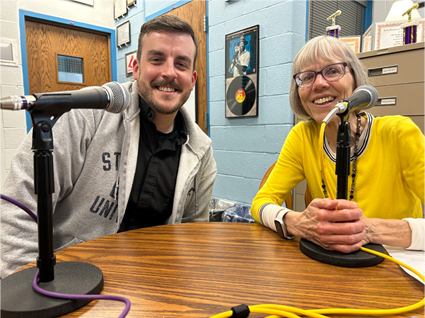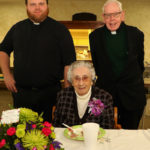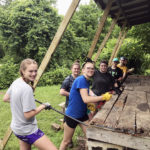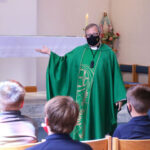By Barb Arland-Fye
Editor

Father Ross Epping and Barb Arland-Fye record a Catholic Messenger Conversations podcast.
Father Ross Epping told me during our Catholic Messenger Conversations podcast earlier this month that our two podcasts together began and ended his time as chaplain of St. Ambrose University in Davenport.
He has served as St. Ambrose University’s chaplain since July 1, 2021 and as pastor of St. Peter Parish in Buffalo since July 1, 2022. His new assignments as parochial administrator of St. Mary Parish in Fairfield and St. Alphonsus Parish in Mount Pleasant will begin July 1.
In the eight years since his ordination to the priesthood on June 6, 2016, Father Ross has served as a parochial vicar, high school chaplain, pastor, priest moderator, diocesan director of vocations and university chaplain.
“Each assignment has given me different challenges, insights, grace,” he said during our conversation in the recording studio of KALA Radio station on the St. Ambrose University campus. During his first assignment, as a parochial vicar for St. John Vianney Parish in Bettendorf (2016-19), he also served for one year (2018-19) as chaplain of Assumption High School in Davenport. “I loved all of my assignments. But I think that one (Assumption chaplain) geared me toward what ministry to young people looks like on a regular basis.”
None of his assignments, however, prepared him for full-time chaplaincy at a Catholic university, which he describes as a fast-paced environment where the community changes constantly as students enter and leave. An important lesson he has learned: “To not get so tied up in minute, stupid details. There is so much life and love to experience among young people. There is so much relationship to build. Getting hung up on the minutiae can be disastrous.”
Students, Father Ross said, “are a reminder to me that life is good and that it has the potential to be so full. These young people are trying to figure themselves out and to map out their future, they’re also trying to map out their present, and who they want to spend time with … their courage and their faith are a constant inspiration to me.” Young adults, he added, “are out and about discovering.”
His day as a chaplain might begin around 9:30-10 a.m. (unless he has administrative meetings beforehand) and might end at 10:30 p.m. or later, depending on students’ needs to meet with him on their timeframe. He might be meeting with a student for spiritual direction or advising students on their academic papers or theology assignments. He attends their sports events, meets with peer mentors and celebrates Mass, adoration and reconciliation with them. “I am always honored that the students trust me with their own experiences of life and talking through their experiences and what (those experiences) mean in the midst of their relationship with God and the world.”
Father Ross believes that “one of the most important things to do on a university campus is to encounter the students as they are … Our greatest desire is to be known and to be seen. That is everyone’s deepest and most heartfelt desire … I think sometimes in the name of evangelization we can skip that part and we go right to the person of Jesus Christ, whom we know but the person sitting across from us may not. Getting to know them, their passions, their desires, their wants in life, what drives them, going to their wrestling meets, their football games and their pickup volleyball matches – those are the evangelizing moments of a university chaplain.”
St. Ambrose and St. Peter Parish communities are two very different communities, both of which he loves, he said. Whereas St. Ambrose is fast-paced, “St. Peter is slow; St. Peter is peaceful. Jumping between the two (communities) is good for me. The people of St. Peter remind me it is good to take a breath, to slow down.”
He said when he first arrived at the parish, Deacon Larry Dankert told him, ‘“Father, you pray the ‘Our Father’ a little more quickly than we do here.’ I think about that every Sunday. We can slow things down. And that’s fine.” Father Ross often writes two different weekend homilies tailored to each specific audience. “I love writing homilies; it’s one of my favorite things to do.”
Getting to know the culture and identity of a parish is another aspect of parish ministry that he appreciates. “I just really enjoy immersing myself in getting to know what that culture is and what its identity might be.”
What is the biggest challenge of being a pastor? Well-meaning people sometimes forgot that “l and everybody else are trying their best. We are all living this life for the very first time. I have been living this life for the first time for 34 years and somebody else might be living it for the first time for 80 years. All of us are trying our best and we really ought to be learning how to extend grace to one another more often than crabby attitudes.”
Father Ross believes that greater reliance on social media “has hindered our ability to encounter one another in a grace-filled way.” He referred to a talk that Pope Francis gave recently to the Swiss Guard, in which he counseled the members to build fraternity with one another. “That is the space where we encounter Christ.”
(Contact Editor Barb Arland-Fye at arland-fye@davenportdiocese.org)











